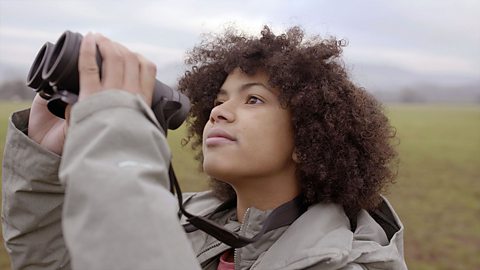What is a river?
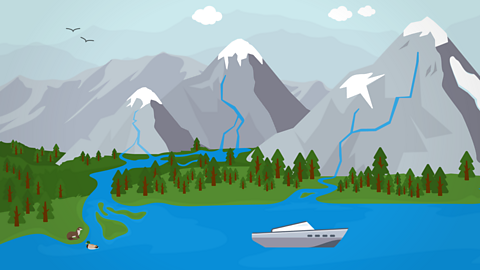
A river is a natural body of water that flows across land.
Rivers often begin in the mountains and hills and they flow downhill because of gravityThe force that pulls things down towards the centre of the Earth. into a sea or ocean.

Watch: Learn about the longest rivers in the UK
Discover more about the longest river in the UK - the River Severn.
Have you ever looked at a river and wondered where all the water has come from? Or where it is going to?
My name is Seren and today I'm investigating the UK's longest rivers.
This is the River Severn, and at 354km long, it's the longest river in the UK. It starts here in Wales, where we call it Afon Hafren.The place where a river starts is called its source. The source of the Severn is at a place called Pumlumon or Plynlimon in English.
When rain falls on the mountains, and it rains a lot in Wales, it flows down to the valley below and becomes a river. The River Severn then flows into England and goes in a big curve through three counties and then out into the sea. This is called the river mouth.
The UK's second longest river is the Thames, which is 346km long, and you'll probably know it as the river that flows through London. The source of the Thames is different to the Severn.
It begins as a tiny trickle of water, called a spring, in the middle of a field.
Rivers are often used as boundaries. So where I am standing is in Wales, but over there on the other side of the Severn, that's England.
In the past, people liked to live nearby a river, because that is where they got their water from and they could use the river's flow to turn machinery like water mills.
And before there were motorways and railways, people used the rivers as the main way of getting the things they've bought and sold from place to place.
But, the downside of living near a river is that it can flood and you might end up with a home full of water. So a lot of money is spent on flood defences to keep people and their houses safe, like the barrier at the River Thames mouth.
What river is nearest to where you live? Where does it start? Where does it end? Go exploring!
Since it's well over 300km to the source of the River Severn from here, I think I'll get a lift. Bye!
Rivers in the UK
Rivers have played a very important part in human history; many cities and towns have formed on their banks.
They serve as a source of water and food, borders between countries and areas, and as a way of transporting people and goods.
In the UK, rivers have been an important source of communication and travel since ancient times.
The rivers were used to build a network of canalsA waterway which is made by people which allows ships and boats to pass from one river to another.. These were first used for transporting goods and materials and nowadays, they are used for boating.
Today, rivers are as important as ever and provide people with not only water, but also electricity.
The longest rivers in the UK
How are rivers formed
A river begins as a tiny stream at a place called the source, usually in an upland area. The water may come from an underground spring, rainfall, melting snow or ice, a lake or a large pond.
As it joins other streams, it grows and becomes a river. The water flows quickly and erodes the land. The river also picks up soil and gravel and carries it further downstream.
This moving water, and the material that the water carries with it, wears away even more rock and soil. It meanders around obstacles such as hills or large rocks that it cannot erode. Over many years, it creates valleys.
When the river reaches gentler slopes, it does not flow as fast and cannot carry the soil, sand and gravel, so they begin sinking into the ground and are deposited on the river bed.
As the river flows onto the flat land, it grows and widens, until finally, it joins the sea at its mouth.
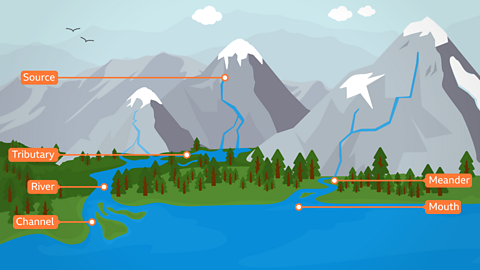
Water cycle and rivers
Water can appear in three stages: gas, liquid and solid.
The water cycle is the way water moves around the Earth and rivers have an important part to play in it.
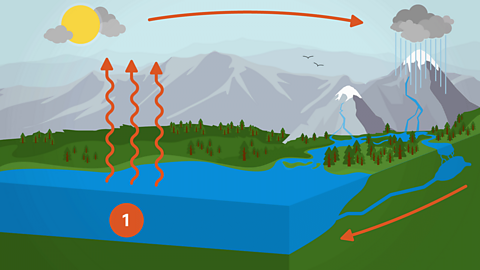
Image caption, 1. Liquid water from the seas and oceans is heated and forms a gas. This process is called evaporation.
Image caption, 2. The water vapour forms clouds in the sky, which are pushed overland by the wind.
Image caption, 3. When water vapour cools, it returns to the liquid state in a process called condensation. The water then falls on the ground as precipitation in the form of rain or snow.
Image caption, 4. Some of this water runs over the surface of the ground to rivers and lakes. This is called collection. The water in rivers flows downhill and ends up in the ocean.
1 of 4
People and rivers
The rivers on Earth carry the water and nutrients that people, animals and plants all need to live.
The early settlers built their towns and villages beside rivers, because it provided them with water and fish, allowed them to grow crops and the rivers served as a means of transport using boats.
These settlements have become important centres of .
People still depend on rivers because:
- they provide cities and towns with water
- when they flood the surrounding land, they leave rich soil ideal for growing crops
- they provide farmers with water to water their crops
- they serve as a means of transport for people
- they create hydroelectricity through damA wall built to hold the water back and control the flow of a river.
- they offer leisureFree time. activities such as boating and fishing
- they serve ports where goods are loaded to and from ships
- living near rivers can also bring certain risks, such as flooding or erosionWearing away. of the land close to houses
- today people use various flood defencesA tool or strategy used to protect an area from flooding or stop flooding. to control the water and therefore protect their homes. One way of doing this is by building dams.
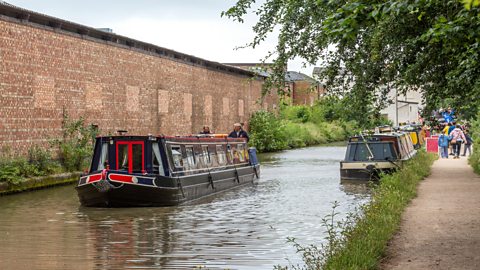
Activities
Quiz: Rivers
Quiz: Parts of a river
Bitesize Primary games. gameBitesize Primary games
Play fun and educational primary games in science, maths, English, history, geography, art, computing and modern languages.

More on Geography of the UK
Find out more by working through a topic
- count5 of 17
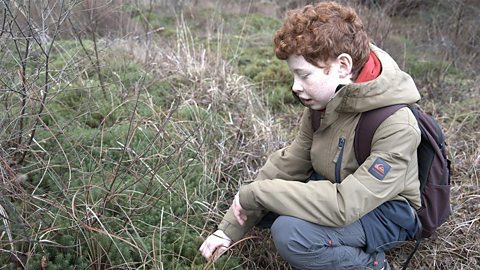
- count6 of 17
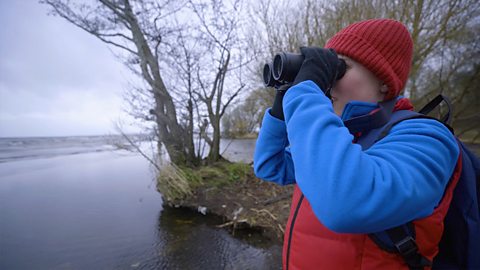
- count7 of 17
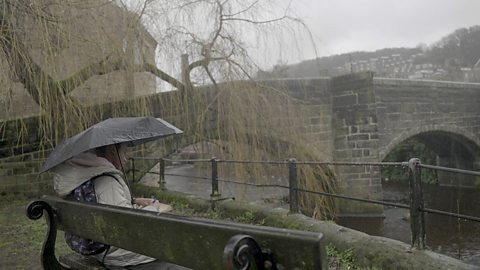
- count8 of 17
